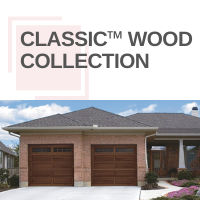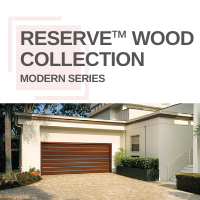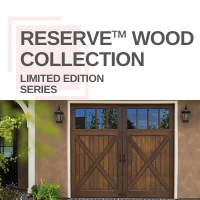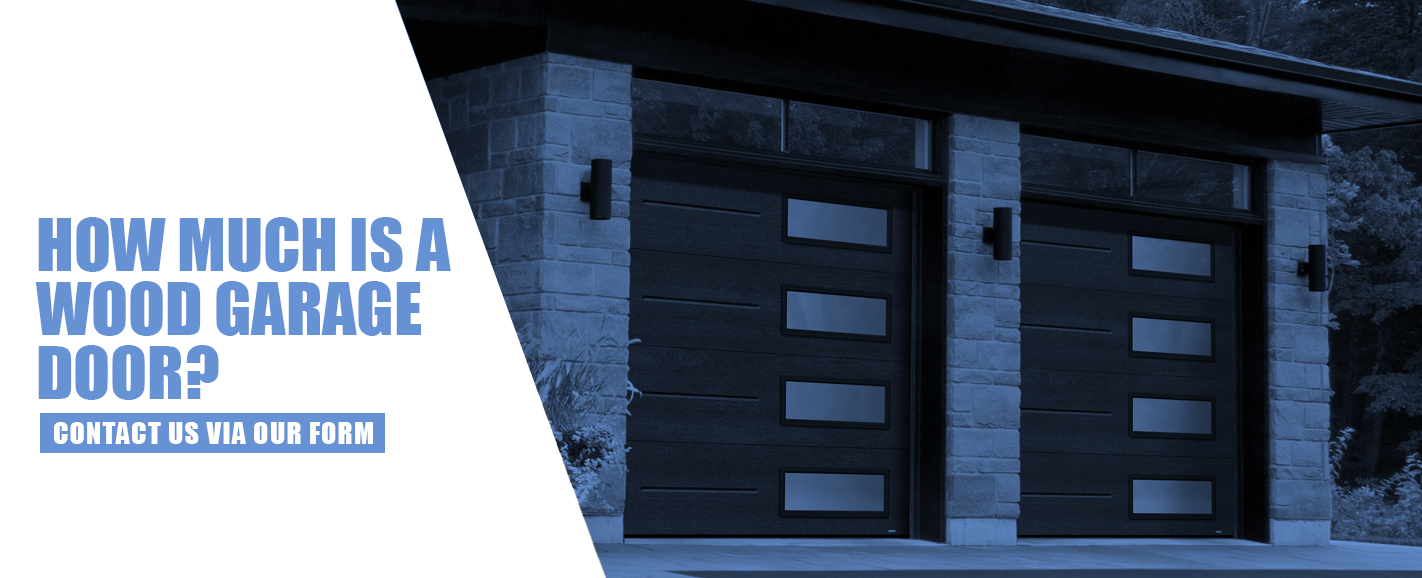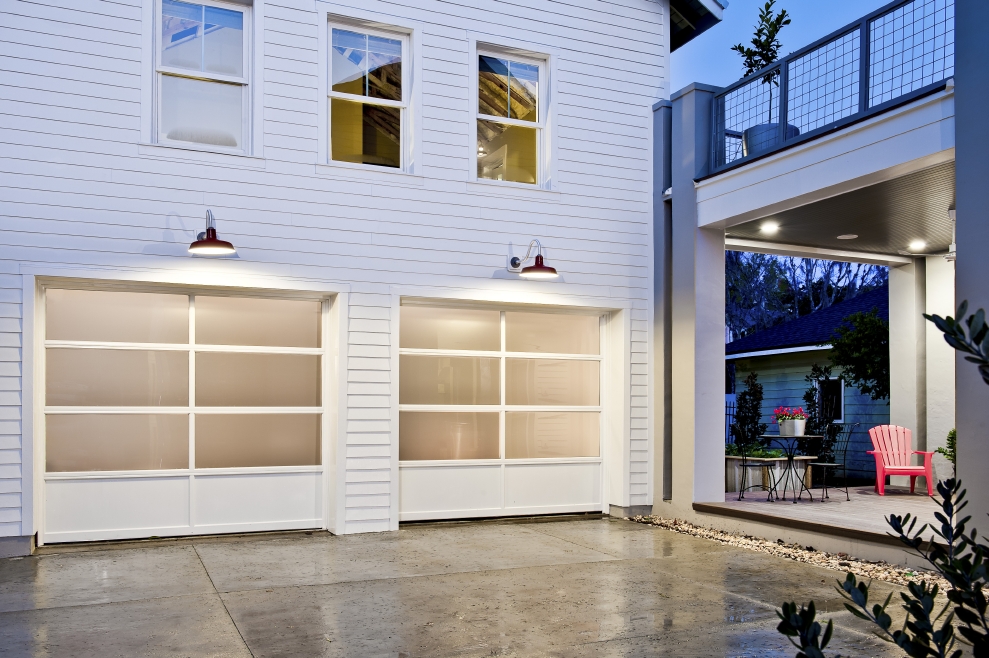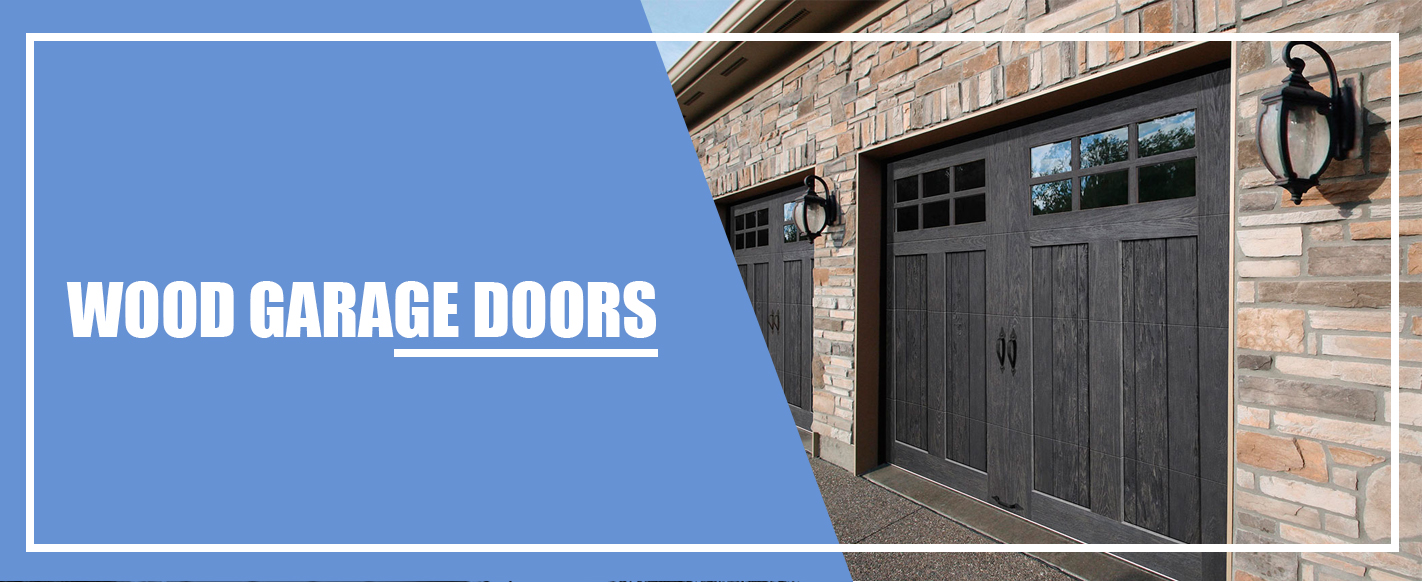
The garage door you choose has a significant impact on the appearance and value of your home. Some would even argue it’s the focal point of your home’s exterior.
So, if you want to make a good impression, few materials stand out quite like wood — it’s timeless, elegant and customizable to perfectly complement the style of your home.
Read our informational guide below to learn about the unique styles of wood garage doors, their pros and cons and the upkeep they require.
Read More About Wood Garage Doors:
Table of Contents
Shop Wood Garage Doors:
Styles of Wood Garage Doors
The style of your wood garage door determines the design, layout and other factors that affect your curb appeal. Here are some popular wood garage door styles to consider:
- Solid Panel: One of the more economical options, solid panel garages consist of flat panels with no other details.
- Raised Panel: These doors are more expensive than solid panel doors, but they also create more visual interest. Raised panel doors feature shapes carved into the wood and add more character to the exterior of your home.
- Carriage Style: This is a timeless, attractive style that is not often in urban areas. Carriage style doors are different from most others in that they look like they open outwards even though most of the time, they actually open upwards. They’re also highly durable.
- Wood With Windows: Adding windows to your garage door is one way to make a great impression on guests. Although pricey to install, most homeowners who opt for this style believe the beautiful results were well worth the cost.
Types of Wood Garage Doors
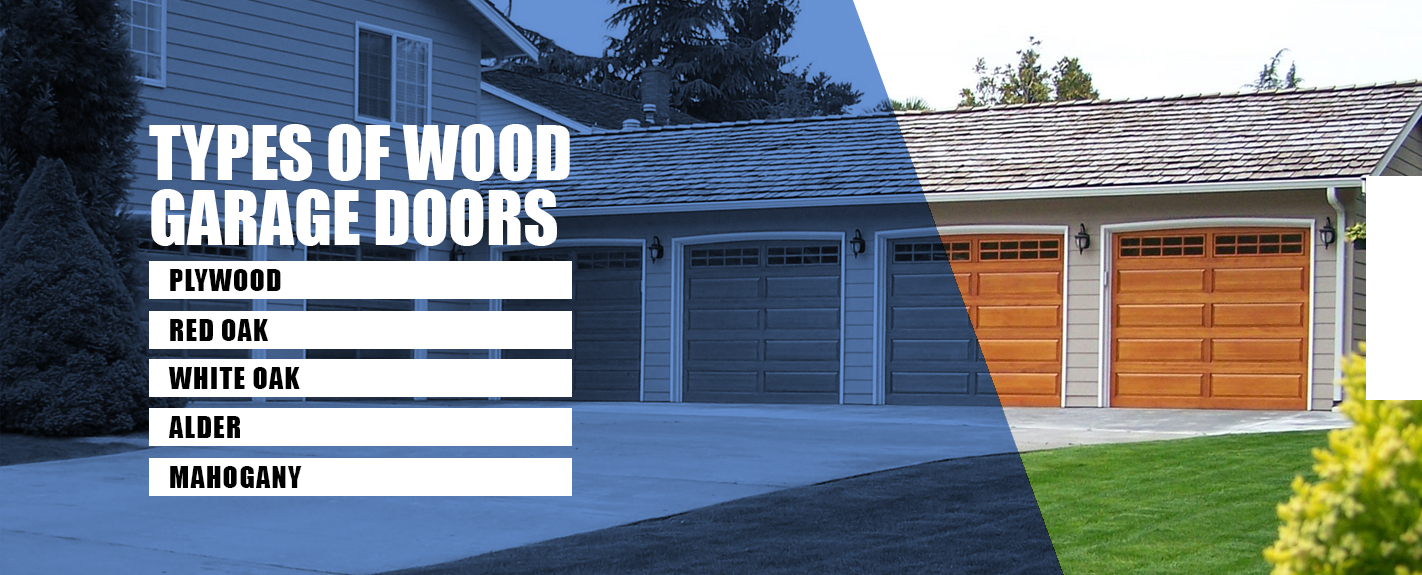
In addition to a style, you must also choose a type of wood. The wood used to make garage doors varies in thickness, quality and weight.
Here are a few commonly used wood garage door materials:
- Plywood: This is the least expensive and most basic wood door type. For a more attractive outward appearance, it may be covered by an exterior hardwood skin. Because plywood is so thin, it may come with some foam insulation.
- Red Oak: This wood is the next most affordable option after plywood. Red oak is hard, heavy and highly resistant to impact and shock. Its grain pattern is also appealing, and it easily accepts wood stains.
- White Oak: Like red oak, white oak is also hard, durable and easily accepts wood stains. Its coloring ranges from white to light brown.
- Alder: Although not well known, this wood is characterized by its abundant knots and uniform color. Alder offers a rustic look that goes well with a log cabin-style home.
- Mahogany: This is a popular wooden garage door material because it is both beautiful and durable. This wood is easy to work with and has a rich, attractive grain that can be finished easily. It’s also strong and rigid, so large panels can be made that won’t warp, split or sag. It also has a natural resistance to pests and moisture. Although many homeowners prefer the wood’s natural red tones, it can also be lightened with bleaching.
- Cedar: Like mahogany, cedar is also a popular choice for wooden garage doors and is resistant to pest and moisture damage. It’s also unlikely to warp or crack in any weather, humidity or temperature conditions. Cedar is a porous wood, which makes it lighter and less work for your garage door opener. It also provides excellent insulation and soundproofing. You have lots of flexibility with cedar — you can finish it with a variety of stains and paints or leave it unfinished, which gives it a natural, weathered look.
- Spanish Cedar: This wood has a high resistance to rot, decay and pests. It looks similar to mahogany and has an appealing scent.
- Redwood: Redwood is one of the most expensive materials for garage doors. It comes with several layers of wood to minimize the risk of warping from water and heat. You may either paint or stain it.
- Reclaimed Wood: This material has recently been gaining popularity and is a great way to give your door a distinctive look. Reclaimed wood has two unique benefits: no trees have to be cut down to obtain it, and it has already been well-seasoned from past use.
Benefits of Wood Garage Doors
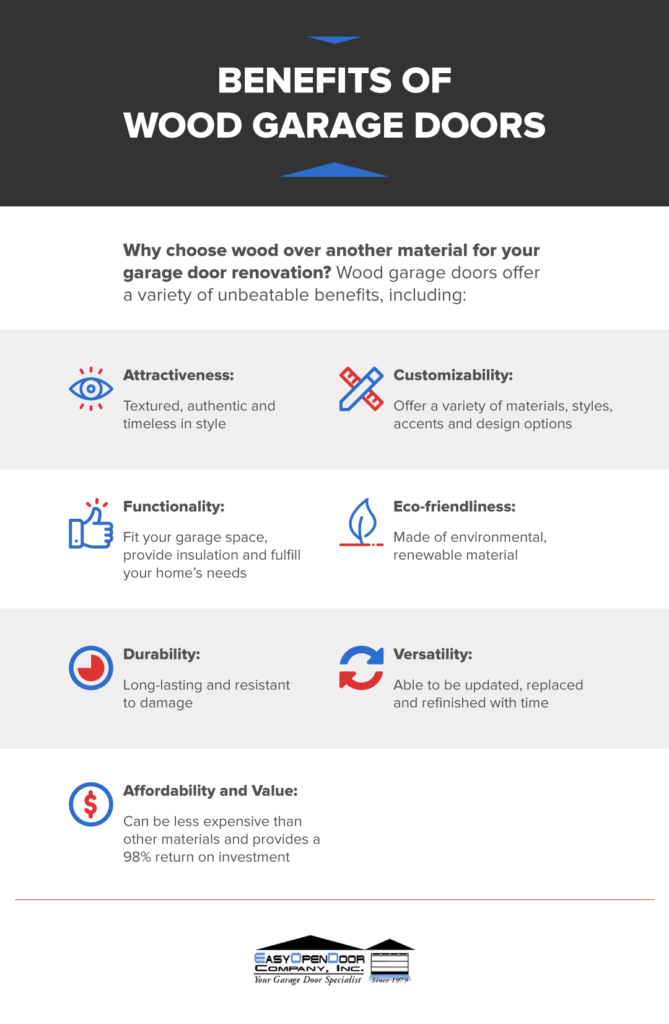
Wood garage doors come with a variety of benefits, including the following:
- They’re Beautiful: Wood garage doors feature attractive textures, designs and finishes no other material can offer. If you’re giving your home a makeover and want something that will pop, go with a wood garage door.
- They Can Be Customized: The number of customization options is virtually endless for wood garage doors. You can choose from a variety of timber types, windows, decorative hardware and accents. Panels also come with several dozen design options. When using wood, you can have your door exactly as you want it.
- They’re Functional: Some spaces are unconventional, and traditional garage doors may not fit. If your garage floor isn’t level or the opening is not a normal size, you may need a custom wood garage door to match the particular specifications of your space.
- They’re Eco-friendly: Because wood is renewable, it’s more environmentally friendly than most other materials.
- They’re Timeless: Wood is unrivaled in its timeless appeal. There are also many styles you can choose from based on your home type and personal tastes, including rustic, classic and luxurious.
- They’re Strong: While metal and vinyl garage doors are easy to crack or dent, wood’s tough surface makes it much more resistant to this type of damage.
- They’re Updatable: If needed, you can remove and replace panels. For example, you can easily replace the top panels with windows. Wood also provides a perfect surface to refinish with new stains or paint colors.
- They Provide Insulation: Wood is a natural insulator, and replacing a vinyl or aluminum door with a wood one will lead to much lower electric bills. They also serve as a natural sound barrier, which can be useful if you live in a noisy neighborhood or on a busy road.
- They Can Be Affordable: Although pricey if highly customized, wood doors can become relatively affordable when certain styles and materials are chosen.
- They Increase Your Home’s Value: Because wood doors can be elegant, modern and attractive, they can boost your home’s value and curb appeal.
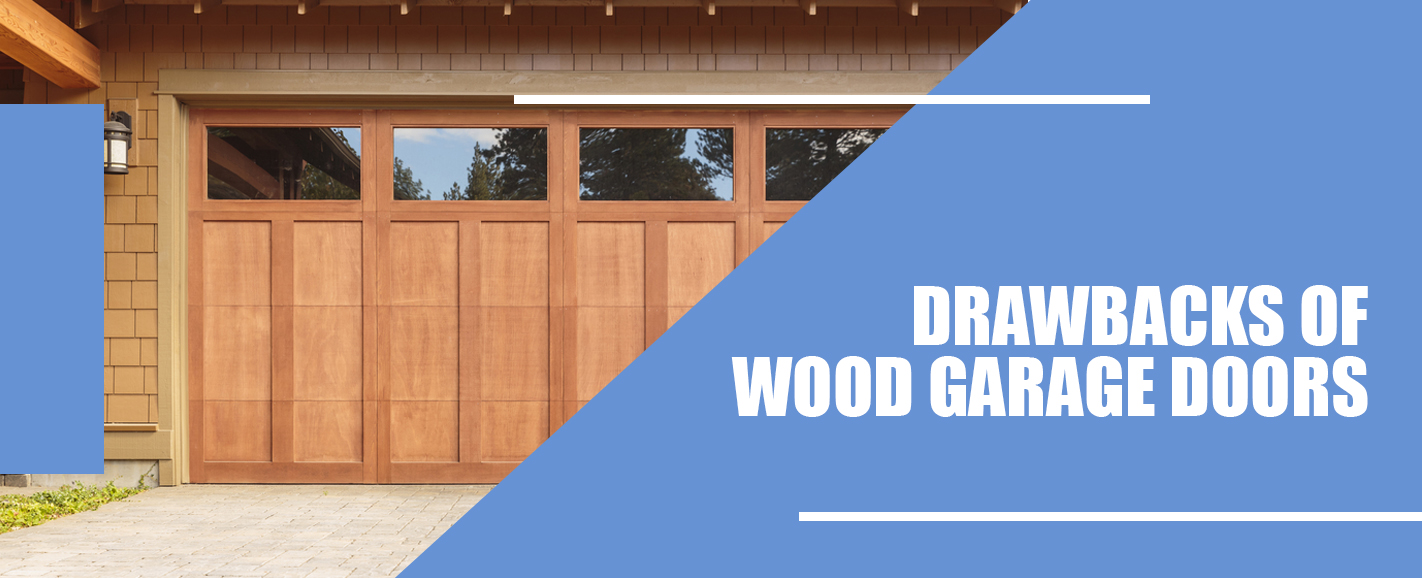
Drawbacks of Wood Garage Doors
Wood garage doors aren’t all beauty though, they have a few disadvantages, as well:
- They Require Regular Maintenance: If you are not willing or able to put in the time to maintain your wood garage door, then it may not be the best material for you. You need to periodically check your door for rot and damage and weatherproof it by applying a protective coating. Neglecting these maintenance tasks may lead to rotting, warping or chipping.
- They’re Not the Most Energy-Efficient Option: If your garage is attached to your home, then energy efficiency may be a concern. While wood does have insulation properties, other materials such as steel tend to insulate better. You can find wood doors that contain insulation, but this will increase the price.
- They’re Generally Expensive: Although they can be made more affordable by limiting customization options, wood doors are relatively expensive in general.
- They’re Heavy: Wood doors are solid and weigh a lot, which means you will have to buy heavy-duty springs to keep your garage door balance. If you’d like to be able to open and close your wood door automatically, you’ll also have to purchase a more expensive heavy-duty door opener.
- They Take Time to Make: While wood doors come in a wide variety of styles, it also takes considerable time for a professional to design, build and install them.
- They Can Rot, Warp and Swell: If you live in an area where snow and rain are frequent during certain months of the year, wood garage doors may cause problems. If your door is exposed to rain or snow, this will slowly weaken the wood and eventually lead to rotting. If there are significant changes in temperature or contact with moisture, wood may start to swell up. This may result in the garage door no longer fitting into its rails, which will affect how smoothly it can go up and down. This may even cause the rails to snap because they cannot hold the bowed door, which could injure someone nearby.
- They Can Decay: Unlike most other types of garage door materials, wood runs the risk of decay. Even when not exposed to wet weather, wood can still begin to decay.
Wood Garage Door Maintenance
If you’ve installed a wood garage door or bought a home that has one, you’ll need to maintain it once a year. Pick a day with nice weather and perform the following tasks:
- Look for Rot: Bacteria and fungus will eat away at the wood, often in places that remain moist for extended periods of time. Inspect the bottom of the door and the trim work, as well. You can check the trim work by prodding it with a long-handled screwdriver. If it goes through the wood surface, this means your door needs repairs, which are best to leave to a professional.
- Search for Pests: While prodding your door, look out for pests, as well. Termites can attack anything made of wood, as can boring beetles and other wood-consuming insects. If you notice any insects around rotting areas, try to identify the pests before treating the door. If you can’t figure out what they are, call a pest control company to help.
- Remove Chipping Finishes and Peeling: Even the highest-quality finishes will peel or crack if they aren’t applied to surfaces that were prepared correctly. If a previous owner painted your door, remove any loose paint chips with a scraper. Then, smooth out areas of uneven wood, fill holes with wood putty and let them dry.
- Add a New Coat of Finish: To continue looking good, your door is going to need a new finish, whether it’s painted, water sealed or polyurethaned. After the damaged wood is repaired and the surfaces are adequately prepped, add a fresh coat in accordance with the directions on the package and let it thoroughly dry. If your door has windows, you may want to tape them to make clean-up easier.
- Examine the Hardware: After the door is refinished and dried, open it and listen for harsh sounds as it goes up. If you hear any scraping or screeching, this isn’t normal — investigate further. You should also tighten all screws, see if the rollers are worn and apply a lightweight grease to the springs to lubricate them.
- Inspect the Deals: Close your door and see if there is light shining into the garage between the door and the seals. If you can, this means your seals need to be replaced. Remove the seals, take them to your local hardware store and look for an appropriate replacement. If your door lacks a bottom weather seal, make sure to purchase one.
How Much Is a Wood Garage Door?
We’ve mentioned that wood garage doors are generally expensive, but the costs vary widely. The main expenses are as follows:
- Materials: Materials account for the bulk of the costs.
- Labor: Varies by Garage Door Company
In addition to the above expenses, various customization options are available. The more things you choose to customize, the higher the price:
- Size: Homes typically come with two-car, three-car or even bigger garages
- Method of Manufacturing: You can buy standard, mass-produced or custom-built doors
- Painting: Painting your door will set you back a few hundred dollars
- Insulation: This typically costs between $100 and $300
- Garage Door Opener: Installing this useful feature for a wood door usually cost close to $500
Below is a breakdown of the expenses for wood garage doors:
- Single Wood Garage Door: $1,700 to $4,300
- Double Wood Garage Doors: $2,600 to $7,000
- Installation of Garage Door Opener: $500
Explore our Wood Garage Doors Online
If you live in San Diego County, come to Easy Open Garage Door Company, Inc. for the highest-quality garage doors and services.
We are a family owned business that has been proudly serving the community for 39 years. Our employees are highly qualified and all have at least 15 years of experience in the garage door field.
We have Wood Door options from Clopay, Carriage House Door, and Ranch House Doors. We also sell LiftMaster electric operators. At Easy Open Door Company, we always follow the manufacturer’s warranty for all our products and will take care of your claims. All of our doors come with a one-year warranty, as well.

